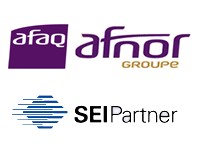CMMI is a structured collection of best practices crystallized over a period of time by the scientists at Software Engineering Institute (SEI), Carnegie Mellon University, Pittsburgh, USA.
DQS India has been a partner to SEI since last 06 years and has been researching the CMMI Implementation and compliance across various organizations of all sizes. As CMMI is a collection of best practices, the benefit of CMMI can be obtained by conducting the best practices while the software development is carried out.
For example, a strong formal review for design document will result in defect prevention. However, if a strong formal review methodology is “actually” not carried out, defects will get injected and then the advantage of CMMI Implementation is lost.
In today’s competitive world projects teams have pressure to deliver quality products on time and within budget. If the best practices are not really implemented, this is difficult to achieve.
DQS India has conducted research on the compliance level of organizations with reference to CMMI best practice compliance and found that there are many best practices that are not followed and hence the benefits are not achieved.
This generates the need of conducting regular assessments for CMMI best practices compliances. In light of this, DQS India is offering CMMI Implementation Maintenance Assessment Packages to its esteemed customers so that they can achieve real benefits of CMMI and in process delight their customers.
Research Indicators Highlighting CMMI Maintenance Need
DQS India carried out research analysis across the industry on non-compliance trend related to CMMI best practices covered under Project Management, Engineering and Support Process Areas. The below-mentioned Research Indicators highlight the need for CMMI Maintenance and Best Practice Implementation:
Project Management Best Practices – Non Compliance Trend:

Project Management Process Areas: It was observed most of the Non-Compliances (NCs) were found in the Project Monitoring and Control (PMC) Process area.
Engineering Management Best Practices – Non Compliance Trend:

Engineering Process Areas: During the analysis it was observed that most of the Non-Compliances (NCs) found in the Requirements Management (REQM) Process area.
Support Best Practices – Non Compliance Trends:

Support Process Areas: It was observed that most of the Non–Compliances (NCs) were observed in the Measurement and Analysis (M & A) Process area.
The above-mentioned Research Indicators highlight the need for CMMI Maintenance and Best Practice Implementation. For detailed research please refer to our micro-site http://www.cmmi-maintenance.com/
NOTE:
The Specific Practice wise Non-Compliance trend analysis is also available with DQS India. For reason of gravity its not being given above.
Feedback:
Thanks for your time to read this Article.
Your feedback is welcome at: rkhare@dqsindia.com
DQS India’s Conflict of Interest Policy is available at www.dqsindia.com © Copyright DQS Certification India Private Limited


